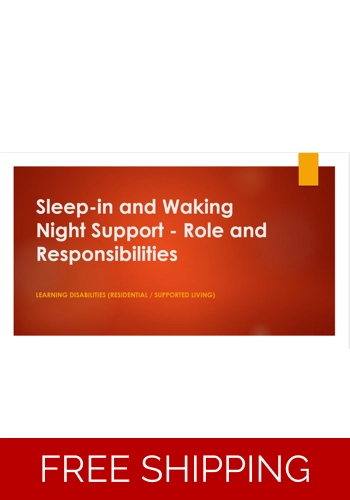Learning Disabilities - Sleep In and Waking Night Support Awareness
Learning Disabilities - Sleep In and Waking Night Support Awareness
Presentation, Handout, Knowledge Check Questions, Trainer Aide Answer Key.
All files editable.
Suitable for:
-
Support Workers
-
Night Staff / Sleep-in Staff
-
Managers / Team Leaders
-
Healthcare Professionals (if applicable)
Overall Aim: To equip staff in residential and supported living settings with the knowledge, skills and confidence to provide safe, person-centred and dignified sleep-in and waking night support for individuals with learning disabilities.
Learning Objectives:
Understand sleep-in and waking night support protocols.
Recognise the needs of people with learning disabilities during night support.
Learn staff roles and responsibilities.
Promote safety, dignity and person-centred care.
Presentation (55 Slides)
Aim and Objectives
Overview of Learning Disabilities – Understanding the People We Support
Examples
Common Challenges (Relevant to Night Support)
Inclusive Approach
Reflection/Discussion Question
How Learning Disabilities Can Affect Sleep and Night-Time Support
Possible Causes of Sleep Difficulties
Impact on the Person
What This Means for Staff
Promoting Positive Sleep Environments
Understanding Sleep-in and Waking Night Support
Sleep-In Support
Expectations and Boundaries
Waking-Night Support
Typical Reasons for Waking Night Support
Expectations and Conduct
Comparison Summary
Legal and Regulatory Considerations for Night Support
Other Relevant Guidance
Key Responsibilities for All Night Staff
Sleep-In Staff Specific Responsibilities
Waking -Night Staff Specific Responsibilities
Limitations of Staff Roles
Important
Identifying Risks During Night Support
Who is Responsible for Risk Assessment
How Risks Are Identified
Nighttime Routines and Individual Care Plans
Call Systems, Alarms and Monitoring Equipment
Emergency Procedures (Fire Alarms, Medical Emergencies)
What to Document During Night Shifts
Handovers Between Day and Night Staff
Handovers Between Night and Day Staff
Reporting Incidents or Concerns
Communication with Family and Healthcare Professionals
Supporting Dignity and Respect at Night
Understanding Sensory Needs and Anxiety at Night
Promoting Independence Where Possible
Managing Challenging Situations
De-escalation Techniques Suitable for Night Shifts
De-escalation - Important
Escalation and Support Protocols
How to Escalate
Managing Fatigue and Stress During Sleep-in/Waking Shifts
Breaks and Rest During Night Shifts
Summary Recap of Key Points
Final Words
References and Further Resources
Word Documents
Handout
Post Session Knowledge Check Questions
Trainer Aide Answer Key
HSC Training Link
Training Resources for Health and Social Care
Supplying training resources for the health and social care
sector since 2004.
Resources purchased are emailed to you via
Zip Folder attachment.
All packs are written in a generic style and can easily
be adapted to suit your own specific training delivery.
Resources are Microsoft Office based.
Secure payments via PayPal Merchant Commerce Platform.
You do not need a PayPal account to use this payment
gateway.
Debit and credit card payments accepted.


